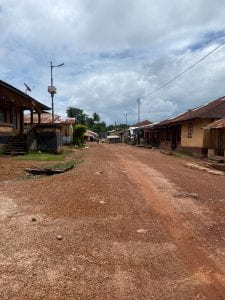Grace, Samara, Matt, and Noah woke up early to meet with their translators, Wara and Allieu, who would help the team conduct interviews today. They set the goal of 50 interviews for the afternoon after which the rest of the day would be spent transcribing the interviews.. Kayla arrived this morning after completing her summer internship; the team happily greeted her and caught her up on the plan for the day. She would spend the rest of the day traveling with other teams to PHUs to see Ukweli operations.
The interviewers showed the team a good location to begin the interviews. They split up with Samara, Matt, and Wara going into the neighborhood on one side of the road and Noah, Grace, and Allieu going into the neighborhood on the other side of the road. Both groups went along the smaller streets of the communities on their respective sides of the road, approaching women and informing them about the study to see if they would like to participate and consent to voice recording. The team saw a great variety of responses among the women of this community, and the data seems of excellent quality. By the end of the afternoon, the groups had a combined total of 46 interviews done! Right before dinner, each group sat down with their respective translator to translate and transcribe the interviews. This is a tedious process, and it can take about an hour to transcribe just two or three interviews. It is important to transcribe every word as closely as possible to what was said in order to make sure the data is accurate. After dinner, Grace and Noah invited their translator to come to the hotel to help them translate the interviews. They were awake until almost 1 AM. Matt and Samara went to bed early because their translator was scheduled to arrive early the next morning to help them.

One of the communities where we were interviewing
The team learned a lot today in terms of efficiency and planning accordingly. The cell phone service shut down during the day and the groups that split could not contact one another. Next time, they agreed to create a meeting spot in a landmark location to check in if they were lost. They also programmed the coordinates of the World Hope office on their phones in case they needed to walk back to the office from the communities. After dozens of interviews, the team learned what methods of communication (including phrasing of questions) are more effective than others. For instance, each team found that the women were confused when they were asked about vaccines. They noted this and rather said “injection” or “marklate” (Krio terminology) in addition to the term “vaccine”. The women were more receptive to this diction and the answers reflected as such. In other words, the team affirmed that they must be good listeners, adaptable and personable.